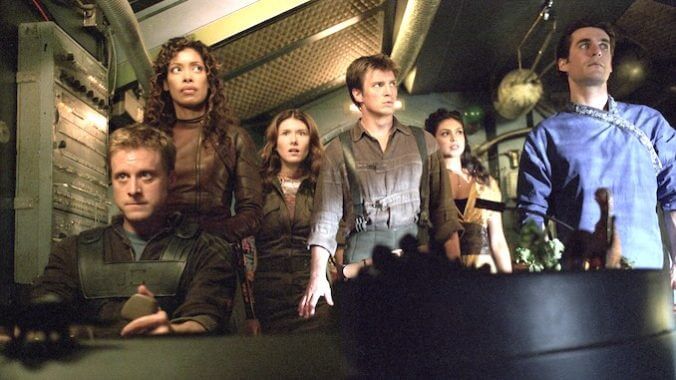One Season Wonders: FOX’s Firefly Is the Holy Grail of Canceled Shows
Photo Courtesy of 20th Television
In the years before streaming, extremely niche TV shows faced uphill battles against cancellation. As a result, TV history is littered with the corpses of shows struck down before their time. In One Season Wonders, Ken Lowe revisits one of the unique, promising scripted shows struck down before they had a chance to shine.

I’m not saying this to brag or be superior: I could not stand Joss Whedon shows way before his public disgrace and the critical flops that seem to finally have soured Hollywood on him. I didn’t like him in the same way I didn’t particularly like Aaron Sorkin—the patter is too clever by half, and it’s so damn pleased with itself about it (while also taking a second to score one off the female characters, always, even when it’s labored).
So, I reflexively did not want to watch Firefly when it kind of, sort of, almost aired on FOX in 2002. FOX was more than happy to help me pass on it, of course: they aired the show perplexingly out of order, gave it a less-than-desirable time slot, and canned it before they had even gotten through the entire episode order. Several of the episodes only aired later on a cable network as an afterthought.
You must understand, though, that if we’re talking about one season wonders, we can’t really start with any other show. Firefly is the epitome of a show people were not able to let go of, and the fact that it returned at one point for a theatrical feature film in 2005 places it as one of the first examples of a show returning from the grave—something that happens much more often now, when streaming services are clawing all over each other to fill out their libraries.
If Firefly had aired 10 years ago instead of 22, it’s not hard to believe that it might have been resurrected in some form or another in the years since its cancellation—or that it never would’ve been canceled in the first place. But it feels like it happened long enough ago that showrunner/co-creator Whedon’s fall from grace hasn’t really elicited much in the way of a critical reevaluation of it—at least not in depth.
But here’s the thing: I did, eventually, slap in the DVD and give this one a try. And for a while, I was a guy who was annoyingly indignant about the show being canceled. Twenty years removed, the show’s problems are more apparent than ever, but it also was a smarter, more interesting show than most of what was on at that point. Since Cowboy Bebop becoming more readily available and The Expanse existing, a lot of what Firefly offers is available elsewhere, from shows that are, to be frank, better.
But I’ll be the contrarian again: even these days, I do kinda miss Firefly.
The Show
It’s 500 years in the future, and humanity has left the ruins of Earth to go out and colonize other habitable worlds. An authoritarian government of wealthy core worlds (city folk) has exerted dominance over the rim worlds (good hardworkin’ rural folk) and those who fought against this War of Core Aggression lost.
Captain Malcolm Reynolds (Nathan Fillion, in the role that made him inescapable) was on the losing side of the war, and as we rejoin him six years later, find he is the leader of a ragtag crew of misfits whose morals are flexible enough to take jobs that involve illegal salvage or straight up theft (just as long as the targets deserve it). He and his crew limp through the cosmos in their Firefly-class cargo ship—no guns, no lasers, no teleporters, no universal translators, and never quite enough gas. The show takes a particular pleasure in being the exact opposite of Star Trek, right down to the living accommodations. When Mal needs to take a piss, he pulls a collapsible head out of the wall.
The show’s pilot (which was actually the last episode that originally aired, for reasons that defy explanation) establishes this with elegance. Mal quotes Beatles lyrics to call for a diversionary tactic, and early scenes establish that space, for a wonder, has no sound in it, unlike every other show and movie ever. Across the 14-episode run, the show’s technological shortcuts are believably gritty and limited in scope. The show is a Space Western in the most literal sense: folk on the frontier talk like they’re below the Mason-Dixon line, herd cattle, and ride around on horses more than they ever do in hover-craft.
-

-

-

-

-

-

-

-

-

-

-

-

-

-

-

-

-

-

-

-

-

-

-

-

-

-

-

-

-

-

-

-

-

-

-

-

-

-

-

-









































